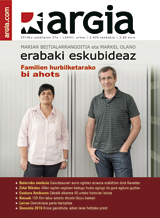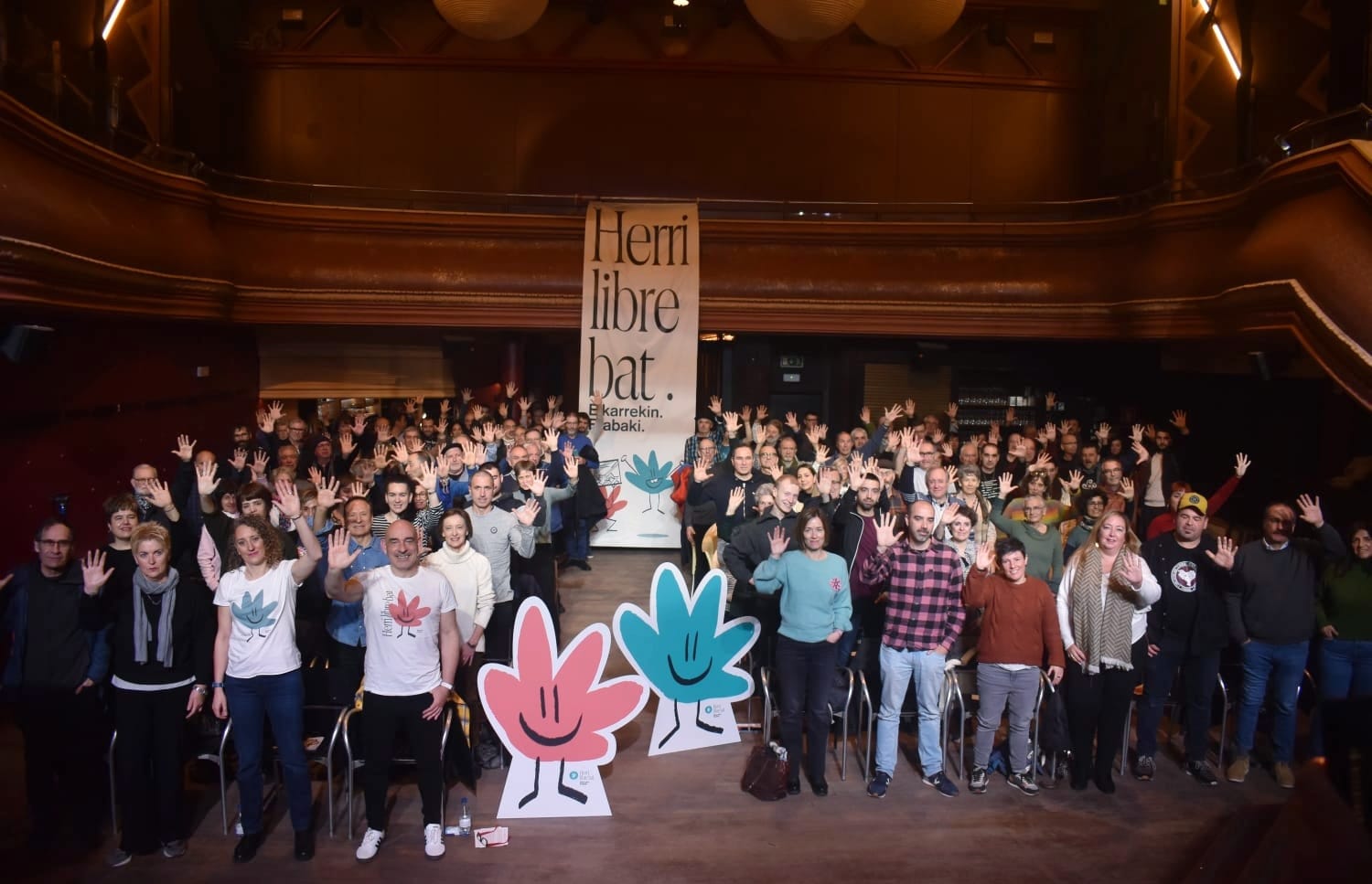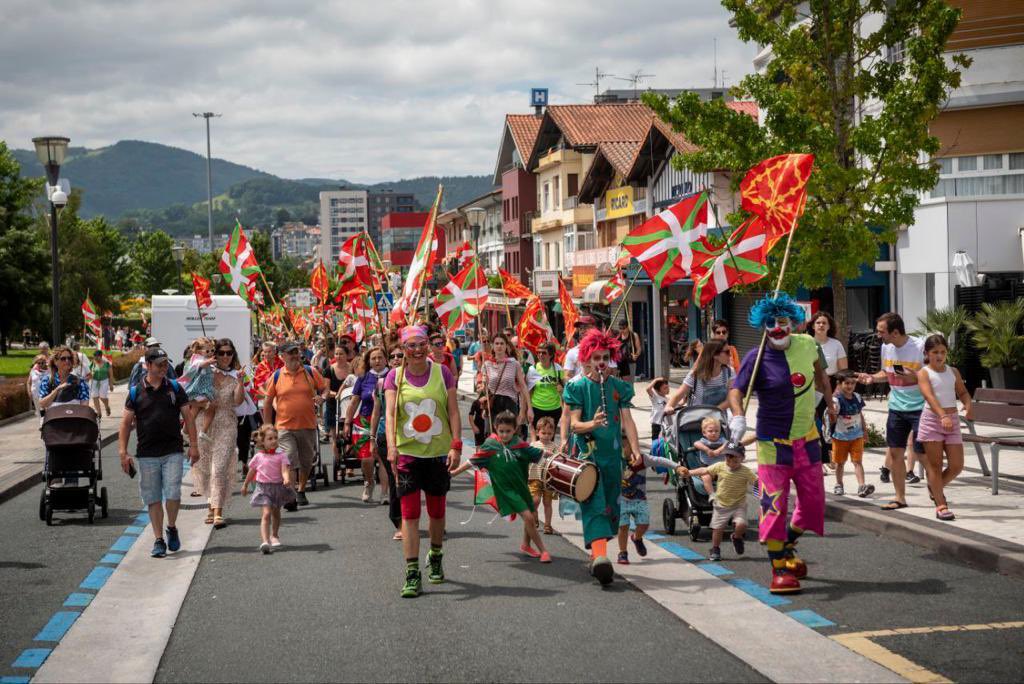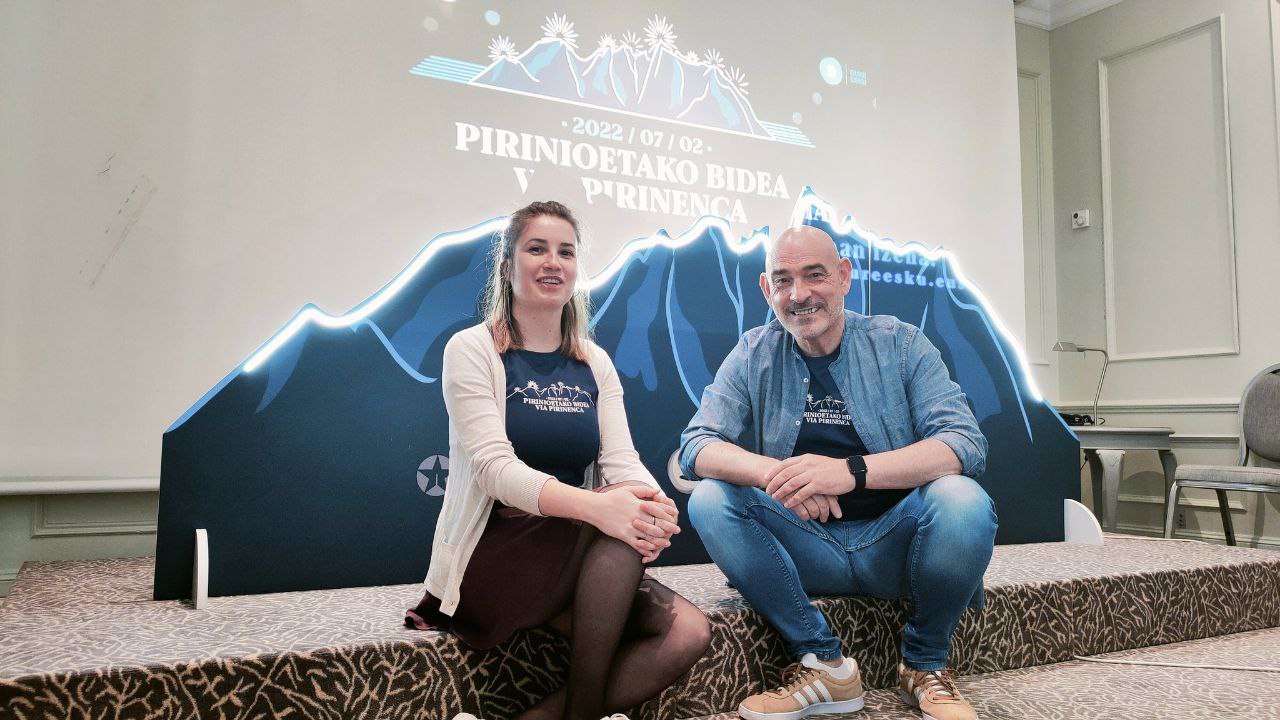"If we don't build Euskal Herria now, they're going to eat us!"
- “Let’s take the road, it’s in our hands. / Thousands of people on foot, caught by hand. Happy people in a free village. In a free people!” Zelai Nikolas would also be happy in a free Basque Country.
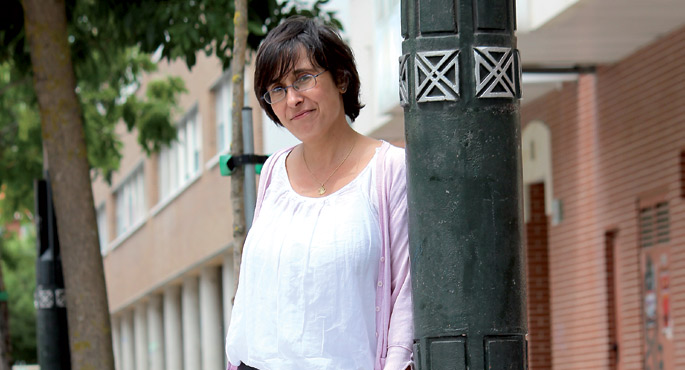
We talked to you on the Argia pages in 2011. The excuse was then the Tiraka blog, within the Basque Government.
We have destroyed it!
Look, the other one!
Yes, it is. Tiraka emerged at the time of newspaper closure. It was then that we began to meet a number of people from the Basque Government concerned about the situation in the Basque Country. These conversations from the first coffee machine, soon after, became a deeper reflection around the table. In a friendly atmosphere, the workers of the Basque Government talked for a long time about the difficulties we had in working in Euskera, and we made proposals on the effectiveness of the Basque plans, on the creation of laws in Euskera, on the role of translation in an administration with its own language... We made that contribution, seeing that at one point the agents did not make it. This concern has brought together a number of people and we have worked for years to offer our collaboration as workers. The reflections are on the table and now we have to begin to materialize them, that is, to create the conditions for working in Basque efficiently. We believe that these instruments are more appropriate and more legitimated by the government itself and by the trade unions than by the simple workers. We, after all, can make our best contribution from our work, but it is up to them to plan and lay down the conditions. So, those of us who were in Tiraka, seeing that we made a contribution, that we did it, that not only we, but also many others, saw that the time for dissolution had come, and so we did in an atmosphere of companionship. In the corridors of Lakua you hear more and more of Euskera, but in the work he commands the dynamic of always. If you work in Euskera, everyone will appreciate you, because Euskera has prestige today, but a structure has not yet been created to work systematically in Euskera.
The creation of structures as such.
To see how they have worked in Scotland, how they have worked in Catalonia, and what strikes me is that they have shared spaces for reflection in both countries. The debate has taken place in a very transparent manner. In Euskal Herria, on the contrary, there are no platforms that work for change. Something has been done between ELA and LAB, but in this town we do not live alone. There are no forums for sharing diagnoses. I'm not talking about decision-making, I'm talking. That doesn't allow us to imagine our future, and if we can't imagine it in a sectoral way, we're not going to put the tools to get a future any way. First of all, we have to imagine the Basque Country that we want, among all and in a consensual way. To do so, we need tools and political consensus. We citizens will continue to make our efforts, because we do not know where the opportunity will be born, but resources are needed to do things in an orderly and systematic manner, with seriousness. People are asking for serious thinking and, to do so, we must work here and there. We have to think about how we want to be in five, ten or twenty years. Think about it.
Jon Sarasua also talks about that in Hiztunpolisa. A long-term reflection…
I am reading Hiztunpolisa and I agree with her reflections. As for thinking about our future, how are we going to be able to unleash the knot of territoriality if we don't talk about it here and there? How are we going to get the Basque issue right, if we do not know what the Castilian speakers think, or do we not know what resources we will have in five years' time? They say that the Basque Country has an interesting geostrategic location. Let's say yes. What does this mean? Who do we get in touch with? With Portugal, United Kingdom, Denmark? What are the options? These kinds of questions are not asked here, and in Spain they are.
Yes in Spain?
Yes. They have eleven institutes, as many as they want. People are willing to think, it's something else if they think it right or wrong. In Catalonia there are also similar structures; the reflection. In any case, what has attracted me most attention has been Scotland, how it has influenced the national debate. The Scottish National Party won the elections and did not proclaim independence: “We are supporters of independence, of course, but we are going to explore all possibilities,” they said. They started a deliberative process, in accordance with deliberative democracy. The theme was analyzed under equal conditions. Everyone had the opportunity to design, elaborate and explain their project in a transparent way. All the arguments were put on the table and the rules for which any decision was made were discussed. Why don't we do it in the Basque Country? We cannot go on like that for another thirty years. Create the conditions for discussion.
Who should create these conditions?
Political parties. They are the ones who manage taxes and taxes are the contribution we all make to improving society. It is the responsibility of the political parties to reach a political agreement. Society, on the other hand, cannot delegate everything, leave everything to the parties. It gives the impression that we are only there to vote. In four years they can do whatever they want, even the opposite of what they promise in their election programme! That would not happen in a healthy democracy. They come to an agreement in the middle of the weeds, in the dark. It's an old, old style. Euskal Herria’s parties should not enter that game.
It is an old style, you say. Before this weak democracy, the dictatorship was harsh in the Spanish state for 40 years. That hasn’t gone by long…
The dictatorship has had and continues to have total influence. The dictatorship caused several fears and several impossibilities. There have been brave people in Euskal Herria, and because of that. But to imagine change, and to imagine things in total freedom, there are a lot of people who can't. “That’s impossible!” they say. But the new generation is also there, we are there, we have not suffered that dictatorship – at least directly – we have not lived these fears … “You do not know … you do not remember …”, they start us, and it is true, we do not remember it, nor do we want to remember it, it is past water, we think otherwise, we have another freedom to think. I have often heard Ibarretxe say that the present generation has not drunk from Franco and that this people has never had so many citizens with a university degree. Many of them, for their part, go abroad. And what are we going to do, let it go?
What do you mean?
Will we let them go and nothing else? Or will we create houses of refuge, referrals, outside Euskal Herria, so they can return, to enrich Euskal Herria with their experience? That is what a people thinks, in the medium and long term. Where are those reflections? What are the authorities' plans?
They say that the Basque is a very active people. Do you do a lot, do you think little?
However, to think about it, adequate spaces are needed. The Basque is active, it is true, and thank you for the insistence! But if you want to think and you don't have a proper place, how will you work the eagle view? Things look very different when you get the opportunity to see the whole picture, the consequences are different. I, as a lawyer, sometimes have to use the eagle approach: when there is a change of law, we have to analyse the reality, the situation in the specific field in question. The landscape is seen from the tip of the mountain, not when you're in the forest.
By law, Madrid also has its own. Just like Paris.
It's not a lie. Since 2011, the Spanish State has only increased its level of activity. Since the Spanish Constitutional Court declared that the Catalan Statute was contrary to the Spanish Constitution, a very tough centralising process is taking place. The State is recovering the views of an eagle that it had lost, it lacked an overview. Since then, laws have become more and more centralized and some competency titles are empty. The State is also invading the exclusive powers of this Community: They're EPSV pensions, it's LOMCE or others. What do we have to do about that? Do we have to continue to do what the state tells us? As it is a law, it must be complied with, but it can be enforced in many ways. What is more, through political agreement you can also change the law. To do this, Euskal Herria needs a country vision, he has to know what instruments he has to say no to the state.
The State can be said not…
They have read the texts of the Spanish constitutionalists and are very concerned about the weakness of their state. They say: “If the Catalan legislature decides to violate Spanish law, the State has no tools to oppose it.” These constitutionalists tell Rajoy to negotiate with the Catalans, because it is not the situation of 1976.
Are the political parties aware of this?
I guess they're waiting. We live in a special political moment. Scotland, Catalonia… The Basque parties do not see what is going to happen in those countries and are therefore waiting. It is possible that the situation will be clarified at the end of January, after seeing what the processes are in Scotland and Catalonia. Despite the special situation, I believe that more dialogue is needed between the parties and, above all, between the nationalists. Talk to each other more and draw what kind of Basque Country we want.
Scotland, Catalonia… Are you looking at Esku Dago?
More than Catalonia, Scotland. Our model is Scotland. There we have seen better how different people have gathered together, how a state has accepted that there is a people, that people, and that people will decide their future. Despite the different ways of thinking, the different political projects, it has been possible to talk about it calmly. On 18 September, when people are going to vote, they will know why to vote yes or no. In Catalonia, it has not been possible to do that, at least to the same extent. However, it is being debated, with transparency, in an orderly manner… They have given us a great demonstration of social organization, of how an injustice has been constituted that has come from the State, of how they have become angry, in an orderly and civilized manner. That is what we have to learn from Catalonia. In Scotland, natural leaders have taken advantage of leadership, they have not sought to mobilise society, but to manage the process, leaving it to then ask the society. Given that in Catalonia they have not been able to manage the process – because the Spanish State has not left it – society itself has assumed leadership, giving legitimacy to the whole process.
Do I have Asku Dago, is it more than a human chain?
Yes. Through Tours Esku Dago citizenship has realized the importance we have when it comes to changing things. There are at least two types of citizens: one who delegates, who only has to elect his representatives, who does not want to do anything else; the other is persevering and who believes that he can contribute something, even if the political parties are responsible. Citizens cannot represent their work, but they can help. But it is important that our representatives act as we want them to know what our will is. We citizens can create the conditions for change and then our representatives will better manage this process of change with the support of the citizens.
You have mobilized society.
We had been saying for some time that we had to activate society, but we didn't know how. Then I saw the documentary Gazta zati bat, and I said “Hori da bide!” So far we have had a defensive attitude in this society, we have been supporting ours, and that leads to contraction, tension, smile, the inability to attract anyone, to see things in a positive way… A piece of cheese shows that things have to be done differently, with a lot of empathy and with the ways, that we have to try to make it understood that Basque society wants to decide. And the one-year work shows us that there are pictures that are impossible. “You can’t have a dialogue between the PNV and the Abertzale left,” and the committees have been working on each other. “You can’t speak in Euskera,” and several meetings have been held in Euskera, even if there are Castilian speaking people, improvising improvised interpretation tools. “50,000 people cannot be gathered together,” and 150,000 people came together. “You can’t talk about the right to decide, it’s not a priority.” Well, if possible, we have already shown that we are. Isn't that possible? Oh my God! It's possible.
No, therefore, “the impossible”…
Ha ha ha ha… No, no! This new time requires more patience. And don't despair. You don’t have to be in a hurry, it falls like a mature apple: you need to put it, think, debate, agree… The rhythm will mark our ability to work. And always with transparency. Right now, for example, pp and PSOE are proposing constitutional reform. They are thinking of a third way of solving the Catalan issue, perhaps for it to be applied to us. Well, it can be. But I do not want that to be agreed in August in an office closed between the two sides. That's one of the great errors of the Constitution of 78, which was not recognized in the Basque Country, and that, necessarily, is a huge burden when you want to build something, and it's in the process of building Euskal Herria. And if we don't build it, they'll eat us! Or we'll stay, we'll just stay, but our children deserve another future.
Zelai Nikolas (Bilbo, 1968) Zuzenbide lizentziaduna da. Ezkondua, hiru seme-alaba ditu. Eusko Jaurlaritzan ari da 1998az gero, legelari. Tiraka blogaren bidez ezagutu genuen Argiaren orrialdeetan orain dela hiru urte, eta hainbat forotan parte hartu du iritzi-emaile. Hala ere, Gure Esku Dago gizarte ekimenak lehenengo lerrora ekarri du Nikolasen irudia, eta, inondik ere, ez du ezkutatzeko ez atzera egiteko asmorik. Euskaldun ekina izatea zer den.
“Administrazioan euskaraz normaltasun osoz jarduteko aukera dago. Nire arloan, legeak euskaraz idazteko aukera osoa dugu. Ezin gaitezke zain egon, edota langile euskalduna gaztelaniaz jarri lanean. Planifikazioak badaude, bai, baina eraginkorrak izan behar dira, bestela ez dute balio. Euskara prestigiatu behar da, eta euskaraz ari diren langileak saritu. Trena abian jarri behar da, eta horrek kostuak ditu. Guri, kostu horiek geureganatzea dagokigu”.
“Garai hartan ez Kataluniak ez Euskal Herriak zuten estatu egiturarik. Gaur aldiz, bai. Egitura ahulak, menpekotasunez beteak, baina estatu egiturak. Horiek abiaraztea zilegi da. Ondoren adostuko dugu Espainiarekin adostu beharrekoa. Bitartean, ordea, gure tresnak erabili behar ditugu. Estatuaren menpekotasunari eraginkor erantzuten ez badiogu, men egiten segitzen badugu, hustu egingo da gure egitura guztia, herdoildu egingo da, eta desegin. Erabiltzearen poderioz olioztatzen dira tresnak”.
“Gure Esku Dagon ez ditugu, besterik gabe, gauzak egin nahi, sentitu egin nahi dugu, gauza politak egiteko gai garela, gauzak antolatzen ere badakigula. Pirritx eta Porrotxekin batera esateko: sentitu, pentsatu, eta egin”.
Frantziako itzuliak duen nazioarteko oihartzuna baliatuko du Gure Eskuk, 'Euskal Herria mundura' izeneko ekimenarekin. Tourreko lehen hiru etapak osoki Euskal Herritik pasako direla baliatuta, "inoiz egin den ikurrinik erraldoiena" zabalduko dute, eta 4.000... [+]
In this photo you can see the txamantxoia or LED spotlight of great power near the top of Mazeko (Belagua) adorned with flag and ikurriña of Navarra. It's powered by a three-battery system that you can see several kilometers in the evening. On 2 July, in the Via del Pirineo... [+]









